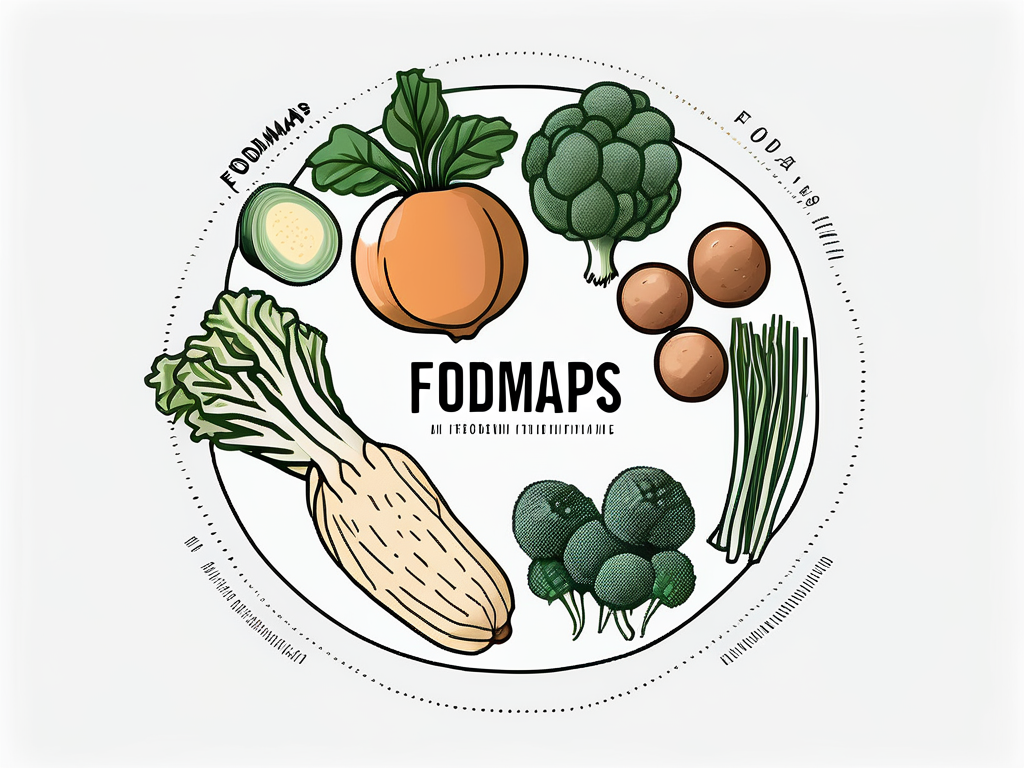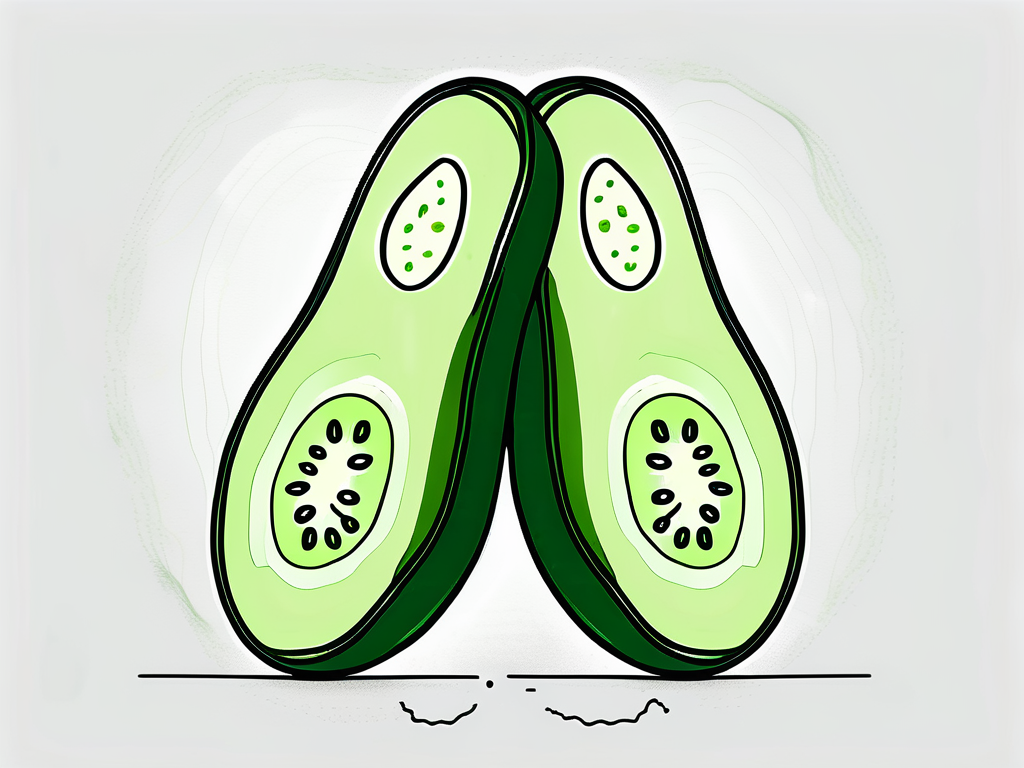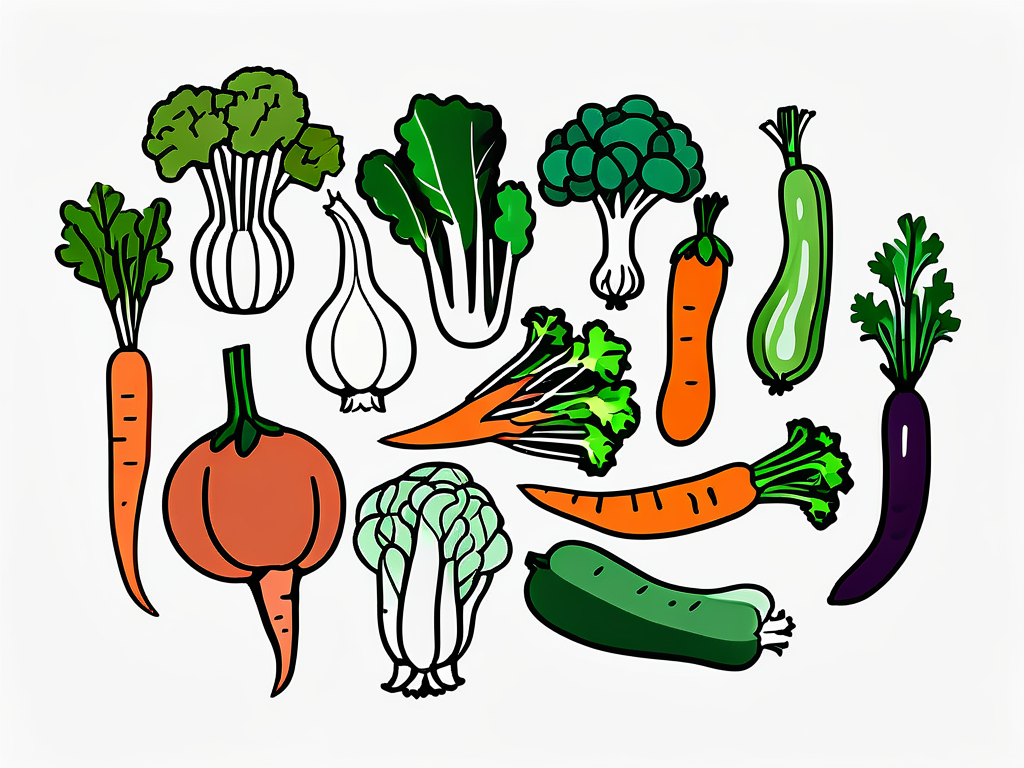Cucumbers are a popular vegetable known for their refreshing taste and crunchy texture. But for those following a low FODMAP diet, the question arises: Are cucumbers low FODMAP? In this article, we will explore the world of FODMAPs, the nutritional profile of cucumbers, and their relationship to FODMAPs. We will also provide tips on how to incorporate cucumbers into a low FODMAP diet and suggest other low FODMAP vegetables to consider.
Understanding FODMAPs
FODMAPs, which stands for Fermentable Oligosaccharides, Disaccharides, Monosaccharides, and Polyols, are a group of carbohydrates that can cause gastrointestinal symptoms in certain individuals. These carbohydrates are poorly absorbed in the small intestine and instead move into the large intestine, where they are fermented by bacteria, leading to symptoms such as bloating, gas, and abdominal pain.

What are FODMAPs?
FODMAPs are a diverse group of carbohydrates that include fructans, lactose, fructose, and polyols. Fructans, found in wheat, onions, and garlic, are long-chain carbohydrates that can trigger digestive symptoms. Lactose, found in dairy products, is a disaccharide that requires the enzyme lactase for proper digestion. Fructose, found in fruits, honey, and high fructose corn syrup, is a monosaccharide that can cause issues in some individuals. Polyols, such as sorbitol and mannitol, are naturally occurring sugar alcohols found in certain fruits and sweeteners.
It's important to note that the impact of FODMAPs on digestive health can vary from person to person. While some individuals may experience significant discomfort and bloating after consuming high-FODMAP foods, others may tolerate them without any issues. This variability underscores the importance of personalized nutrition and understanding one's own digestive system.
Why are FODMAPs Important for Digestive Health?
For individuals with digestive disorders such as irritable bowel syndrome (IBS), FODMAPs can exacerbate symptoms and lead to discomfort. Understanding and managing these carbohydrates can help alleviate digestive issues and improve quality of life.
Furthermore, research has shown that a low-FODMAP diet can be an effective way to manage symptoms in individuals with IBS. By reducing the intake of these fermentable carbohydrates, many people experience a reduction in bloating, gas, and abdominal pain. However, it's essential to work with a healthcare provider or a registered dietitian when embarking on a low-FODMAP diet to ensure nutritional adequacy and proper guidance throughout the process.
The Nutritional Profile of Cucumbers
Cucumbers are a low-calorie vegetable that adds a refreshing crunch to salads, sandwiches, and even beverages. They are composed mostly of water, making them a hydrating choice. Let's explore the key nutrients found in cucumbers and their potential health benefits.
When it comes to cucumbers, their nutritional value goes beyond just being a hydrating snack. These green veggies are not only low in calories but also high in vitamins and minerals that are essential for overall health. They are a great source of vitamin K, which is crucial for blood clotting and bone health. In fact, just one cup of sliced cucumbers provides about 20% of the recommended daily intake of vitamin K. Additionally, cucumbers are rich in vitamin C, an antioxidant that supports immune function and collagen production. This vitamin is vital for maintaining healthy skin, bones, and connective tissues.
Key Nutrients in Cucumbers
Cucumbers are rich in several essential nutrients, including vitamin K, vitamin C, and potassium. Vitamin K plays a crucial role in blood clotting and bone health. Vitamin C is an antioxidant that supports immune function and collagen production. Potassium is an important mineral for maintaining fluid balance and regulating blood pressure.
Moreover, cucumbers are a good source of potassium, an essential mineral that helps regulate fluid balance, muscle contractions, and nerve signals in the body. Potassium is particularly important for maintaining healthy blood pressure levels and reducing the risk of stroke. Including potassium-rich foods like cucumbers in your diet can help support heart health and overall well-being.
Health Benefits of Cucumbers
In addition to their nutritional content, cucumbers may offer various health benefits. Their high water content can help in hydration, and their fiber content promotes healthy digestion. Cucumbers also contain antioxidants that protect cells from damage and may have anti-inflammatory properties.
Furthermore, the antioxidants found in cucumbers, such as beta-carotene and flavonoids, play a key role in reducing inflammation in the body and protecting against chronic diseases. These compounds help neutralize harmful free radicals, which can cause oxidative stress and damage to cells. By including cucumbers in your diet regularly, you can benefit from their anti-inflammatory properties and support your body's natural defense mechanisms.
Cucumbers and FODMAPs
Now, let's dive into the relationship between cucumbers and FODMAPs. Are cucumbers low in FODMAPs?
Are Cucumbers Low in FODMAPs?
Yes, cucumbers are considered low FODMAP. They contain low levels of FODMAP carbohydrates, specifically fructans and polyols. This means that individuals following a low FODMAP diet can enjoy cucumbers without triggering digestive symptoms.
How Cucumbers Affect Digestion
Cucumbers are mostly water and fiber, which can contribute to healthy digestion. The water content helps maintain adequate hydration, while the fiber content supports regular bowel movements. However, it's important to note that everyone's digestive system is unique, and some individuals may still experience discomfort after consuming cucumbers. If this is the case, it's best to consult with a healthcare professional or registered dietitian.
Furthermore, cucumbers are a versatile vegetable that can be enjoyed in various ways. They can be sliced and added to salads for a refreshing crunch, pickled for a tangy flavor, or blended into smoothies for a hydrating boost. Cucumbers are also a great source of vitamins and minerals, including vitamin K, vitamin C, potassium, and magnesium. These nutrients play essential roles in supporting overall health and well-being.
In addition to their nutritional benefits, cucumbers are known for their skincare properties. The high water content in cucumbers can help hydrate and soothe the skin when applied topically. Cucumber slices are often used in DIY facial masks and eye treatments to reduce puffiness and rejuvenate the skin. Some skincare products even contain cucumber extract for its soothing and cooling effects.
Incorporating Cucumbers into a Low FODMAP Diet
If you're following a low FODMAP diet and want to incorporate cucumbers, here are some tips to help you enjoy this refreshing vegetable:

Cucumbers are not only hydrating but also low in calories, making them a great addition to your low FODMAP meal plan. Rich in vitamins and minerals, cucumbers can provide a crunchy texture and a burst of freshness to your dishes.
Preparing Cucumbers for a Low FODMAP Diet
When preparing cucumbers, it's essential to remove the skin and seeds, as these parts contain higher levels of FODMAPs. Peeling the cucumbers and scooping out the seeds can help reduce the FODMAP content, making them more suitable for a low FODMAP diet.
Additionally, marinating cucumbers in vinegar or lemon juice can enhance their flavor while also potentially reducing their FODMAP levels further. This simple step can add a tangy twist to your cucumbers, making them even more enjoyable to eat.
Delicious Low FODMAP Cucumber Recipes
There are plenty of tasty low FODMAP cucumber recipes to try. Enjoy them in salads, as a refreshing side dish, or even in beverages. Here are a few ideas:
- Cucumber, tomato, and feta salad: Combine sliced cucumbers with cherry tomatoes and crumbled feta cheese. Drizzle with olive oil and a squeeze of lemon juice.
- Cucumber and mint-infused water: Add sliced cucumbers and fresh mint leaves to a pitcher of water. Let it sit for a few hours to enhance the flavor.
- Cucumber and smoked salmon roll-ups: Spread lactose-free cream cheese on cucumber slices, then roll them up with a slice of smoked salmon.
Experiment with different herbs and spices to create unique flavor combinations that suit your taste preferences while keeping your meals low FODMAP.
Other Low FODMAP Vegetables to Consider
If you're looking to diversify your low FODMAP vegetable options, here is a list of vegetables that are generally considered low in FODMAPs:

- Carrots
- Green beans
- Lettuce
- Zucchini
- Bell peppers
- Bok choy
- Cabbage (in limited quantities)
Adding variety to your low FODMAP diet can not only make your meals more interesting but also ensure you're getting a wide range of nutrients. Carrots, for example, are not only low in FODMAPs but also rich in beta-carotene, which is converted into vitamin A in the body, supporting healthy vision and immune function. Green beans are another great option, providing fiber, vitamins, and minerals while being gentle on the digestive system.
Tips for Eating a Balanced Low FODMAP Diet
When following a low FODMAP diet, it's important to ensure you're still getting a range of nutrients. Here are some tips to help you maintain a balanced diet:
- Include a variety of low FODMAP fruits and vegetables.
- Opt for alternative sources of fiber, such as oats, quinoa, and chia seeds.
- Choose lean proteins like poultry, fish, and tofu.
- Incorporate healthy fats from sources like avocados, olive oil, and nuts.
Remember to listen to your body and consult with a healthcare provider or dietitian to ensure you're meeting your nutritional needs while following a low FODMAP diet. By making informed choices and being mindful of your body's responses, you can successfully navigate this dietary approach.